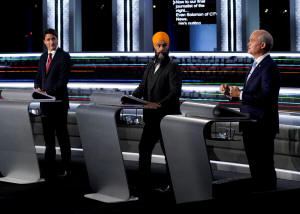Explainer-In tight Canada election, another minority government is
likely
 Send a link to a friend
Send a link to a friend
 [September 20, 2021]
OTTAWA (Reuters) - Opinion polls
indicate no party will gain a majority of seats in the Canadian election
on Monday, for the second straight time, leaving one of the two
front-runners - Liberal Prime Minister Justin Trudeau or Conservative
leader Erin O'Toole - trying to govern with a minority. [September 20, 2021]
OTTAWA (Reuters) - Opinion polls
indicate no party will gain a majority of seats in the Canadian election
on Monday, for the second straight time, leaving one of the two
front-runners - Liberal Prime Minister Justin Trudeau or Conservative
leader Erin O'Toole - trying to govern with a minority.
Six parties are contesting the election.
Trudeau, who has led a minority government since 2019, called an early
election in a bid to capitalize on the Liberals' handling of the
pandemic and swing to a majority.
Here is how events could play out after the vote:
IF ONE PARTY WINS A MAJORITY
If Trudeau wins a majority of the 338 seats in the House of Commons, he
will remain prime minister. A party needs at least 170 seats for a
majority. The Liberals currently have 155 seats.
If O'Toole wins a majority, he would take over as prime minister after a
two-week transition period.
ONE PARTY WINS THE MOST SEATS BUT FALLS SHORT OF A MAJORITY

To govern Canada, a prime minister must show that he or she has the
confidence of the House of Commons, the elected chamber of parliament.
If the result is a minority, the incumbent prime minister has the
opportunity to test his or her standing with a vote of confidence. That
would be the case even if Trudeau wins fewer seats than O'Toole.
If the Liberals win more seats than the Conservatives but fall short of
a majority, Trudeau would have to rely again on opposition parties, such
as the left-leaning New Democratic Party (NDP) or the Greens, to pass
legislation.
There is little chance of a formal coalition, where New Democrats would
serve in a Trudeau Cabinet. Canada has had only one coalition and that
was in 1917, during World War One.
More likely is a deal whereby the NDP continues to back the Liberals in
exchange for Trudeau committing to some of its priorities.
THE FIRST STEPS
If Trudeau decides to test the confidence of the House, he could first
swear in a Cabinet during a ceremony presided over by Governor General
Mary Simon, the Canada-based representative of the head of state, Queen
Elizabeth.
[to top of second column]
|

Liberal Leader Justin Trudeau, left to right, NDP Leader Jagmeet
Singh, and Conservative Leader Erin O'Toole take part in the federal
election English-language Leaders debate in Gatineau, Canada,
September 9, 2021. Adrian Wyld/Pool via REUTERS/File Photo

That does not have to happen immediately, especially if there are
automatic recounts in some seats where the results are particularly
tight. The COVID-19 pandemic has also seen a record number of
mail-in ballots, which could further delay results.
Assuming Trudeau tries to govern either alone or with another party,
he would then convene the House of Commons. That does not have to
happen immediately, since the rules dictate parliament only has to
meet once a year.
IF TRUDEAU LOSES HIS FIRST VOTE OF CONFIDENCE
If Trudeau were to lose his first confidence vote, he could request
another election. But in all likelihood, the governor general would
then ask O'Toole whether he could form a government, citing the need
to avoid two elections in quick succession.
O'Toole could, on paper, face more challenges, since the NDP is less
ideologically aligned with the Conservatives. But NDP leader Jagmeet
Singh, whose party is expected to make gains and play a kingmaker
role, told Reuters he would work with anyone to achieve his party's
goals.
The Conservatives could also turn to the separatist Bloc Quebecois,
which seeks independence for the predominantly French-speaking
province of Quebec. But the idea of federal parties cooperating with
the Bloc is especially sensitive.

(Editing by Peter Cooney)
[© 2021 Thomson Reuters. All rights
reserved.] Copyright 2021 Reuters. All rights reserved. This material may not be published,
broadcast, rewritten or redistributed.
Thompson Reuters is solely responsible for this content. |